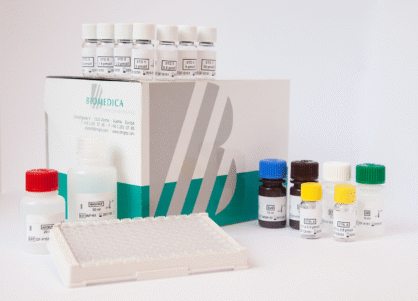25-OH Vitamin D ELISA Kit
25-hydroxyvitamin D (25-OH vitamin D) is the primary circulating form of vitamin D and is widely recognized as the most reliable biomarker for assessing overall vitamin D status in the body. It is produced in the liver through hydroxylation of vitamin D obtained from sunlight exposure, diet, or supplements. 25-OH vitamin D plays a central role in calcium and phosphate homeostasis, bone health, and immune function, and its levels in serum or plasma provide a stable indicator of vitamin D stores over time.
In research, 25-OH vitamin D is used to investigate the relationships between vitamin D status and a variety of health outcomes, including bone density, fracture risk, autoimmune diseases, cardiovascular health, and metabolic disorders. Researchers also study how genetic factors, diet, seasonal variation, and environmental exposures affect circulating 25-OH vitamin D levels. Its measurement helps in exploring mechanistic links between vitamin D deficiency and disease processes, as well as in evaluating the efficacy of supplementation strategies in both population-based and clinical studies.
Clinically, 25-OH vitamin D serves as a key diagnostic biomarker for detecting deficiency or insufficiency, which can lead to rickets in children, osteomalacia in adults, and increased susceptibility to certain chronic conditions. Monitoring 25-OH vitamin D levels guides supplementation and therapeutic interventions to maintain optimal bone and metabolic health. Its widespread use in both research and clinical practice makes it an essential biomarker for understanding and managing vitamin D-related physiology and disease risk.
This 25-OH Vitamin D ELISA Kit is manufactured in USA by DLD Diagnostika.




